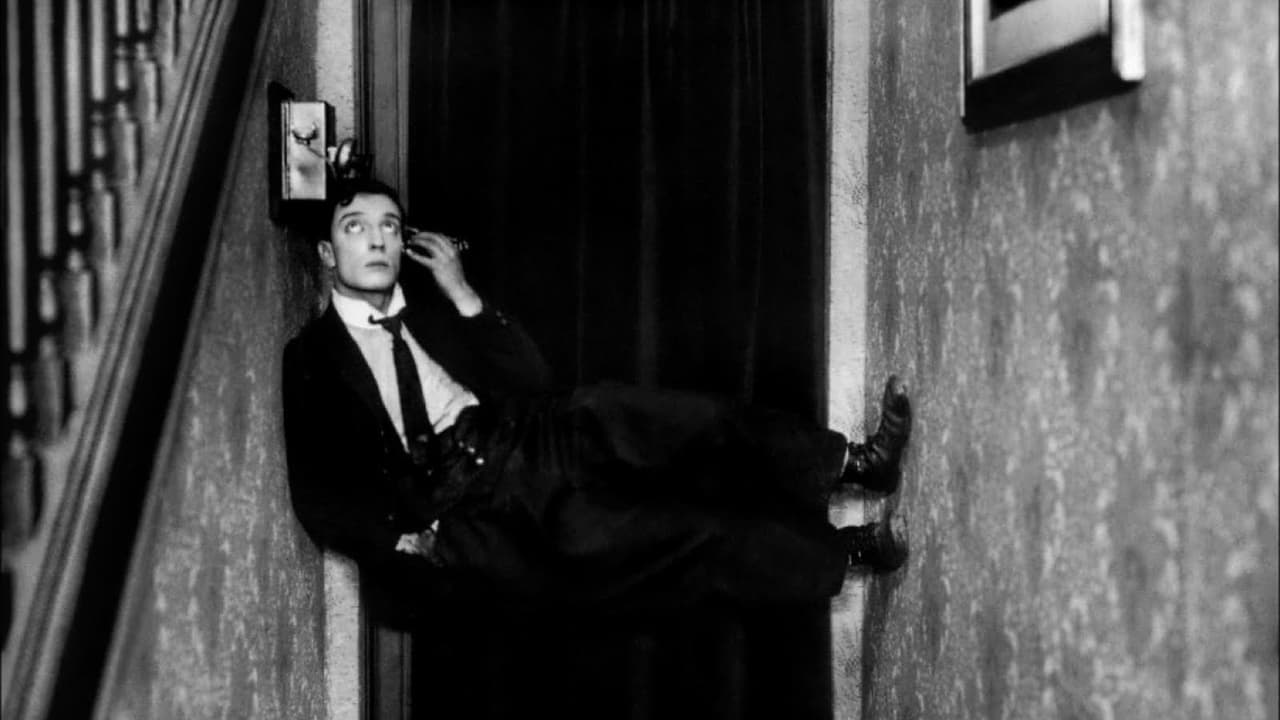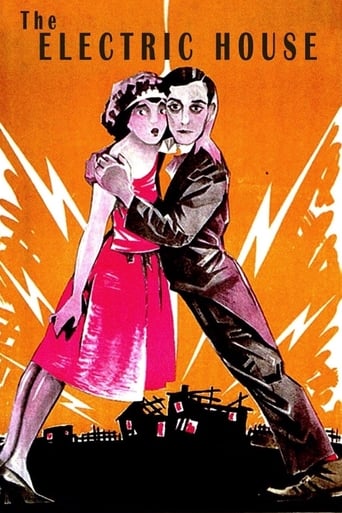

This is a 1922 movie which also runs for roughly 22 minutes. Buster was in his mid-20s here and this was already at the end of his silent short film career. Once again he collaborated with Eddie Cline and was director, writer and lead actor. The supporting actors are Joe are Virginia Fox and Joe Roberts. These two worked with Leaton on several occasions as well. just like these several family members that Keaton cast in very minor roles.Our hero is instructed to install new electrical equipment in a millionaire's house while he isn't on holidays. When he returns, everything is ready, but basically nothing is working properly. Almost all the jokes here deal with malfunctions of mechanical applications, such as a swimming pool, an escalator, a model railway etc. But it wasn't really funny and some of it also became a bit repetitive such as the escalator scenes. The only really funny moment I thought was at the end when the millionaire's daughter lets out the water and the millionaire is so angry that he lets it in again. Oh yeah.. the daughter in here delivers the romance aspect, but it's almost non-existent in this film compared to other silent classics. The (attempted) suicide scene is a fine example of what Keaton made different from other silent film stars. There is always some real tragedy to his characters, even if it's still somewhat funny. It's good. It fits his physical appearance I would say. All in all, however, I would not recommend watching this one. Not one of Stoneface's finest.
... View MoreWhat makes The Electric House such a must-see Keaton short is curiously not the showcasing of the great man himself but that of the technical prowess of his technical director Fred Gabourie. Gabourie had built The Boat and worked with Keaton since 1920's One Week, which was the one with the ingenious portable house, and he would progress with Keaton from the shorts to the features. But never were the technical gadgets Keaton used and Gabourie had to make work practically better displayed than in The Electric House. Keaton really lets Gabourie's gadgets take centre stage here and it is a chance to marvel at a master at work.In a strange way it's almost too brilliant because the laughs don't really play as well. Whereas in One Week or The Boat the gadgets and physical comedy worked in perfect harmony in The Electric House Keaton lets the film get a bit bogged down in watching the gadgets at work.Nevertheless in these days of CGI and visual cheats it is stunning to see these practical effects in full flow. Gabourie was clearly a genius, one whose name deserves to be held in the same light as practical effects masters like Willis O'Brien, Ray Harryhausen and Stan Winston.
... View MoreElectric House, The (1922) ** (out of 4) One of the least entertaining Buster Keaton shorts has him turning his Dean's house into a house of the future will all sorts of wild, electrical gadgets. The best joke in the film is near the start of the film when the electric stairwell goes out of control and sends Buster and the Dean out the window and into the pool. The rest of the film looks good but none of the jokes really work.Available in Kino's The Art of Buster Keaton set, which is one of the greatest collections of films out there.
... View MoreIn addition to the remarkable stunt-work that makes his films unique, Buster Keaton often employed the odd mechanical gadget, and there's certainly much amusement to be found in his technical creativity. 'The Electric House' is a 20-minute short film that dedicates itself entirely to Keaton's gadgets, as a young botany graduate is mistakenly hired as an electrical engineer to wire up a new home. After perusing a book entitled "Electricity Made Easy," Keaton develops a selection of clever and useful household contraptions, including an escalator, a railway system that delivers food to the dinner table, a quick-emptying and re-filling outdoor pool and a self-operating billiards table. Some of the mechanical devices don't quite work as planned, but generally Keaton has done a fair job, and he has certainly invented a few mechanisms that I wouldn't mind having in my own home (assuming, of course, that they operated as they were supposed to).However, the begrudging electrical engineering graduate who missed out on the job arrives at the new electric house to wreak havoc and achieve his revenge. From the moment he starts moving about wires, the contraptions inside the home begin to go crazy, and poor Keaton is completely at their mercy, unable to understand why his inventions have gone haywire. Of course, there are a few gags that don't quite work {such as Keaton thinking he's seen a ghost}, and the editing is a little choppy at times, but it's all in such good fun that you won't feel disappointed. A lot of amusement is derived from something as simple as an escalator {which was then a relatively new invention, only 25 years or so years old}, with Keaton, in one particularly funny sequence, trying to haul a bulky suitcase up the "stairs" and bafflingly wondering why he's making such little progress.As the hapless hero, Keaton takes his fair share of beatings from the mechanical devices {in fact, production had to be delayed because he broke his ankle after it got caught in the escalator}, but the other members of the household don't escape unscathed. Joe Roberts plays the disgruntled homeowner whose house is equipped with mischievous gadgetry, and he gets acquainted with the property's swimming pool on at least two entertaining occasions. Though Keaton has certainly done funnier comedic shorts, 'The Electric House (1922)' is an amusing way to pass 20 minutes, and the star's undeniable enthusiasm for slapstick comedy makes his work always worth a watch.
... View More